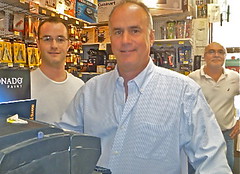 Shira Levine From left, Jason Brickman, his father, Paul Brickman, and in the backgroudn the store manager, Ruben.
Shira Levine From left, Jason Brickman, his father, Paul Brickman, and in the backgroudn the store manager, Ruben.For every East Village business that’s opening or closing, dozens are quietly making it. Here’s one of them: H. Brickman & Sons.
Want to stay in business for seventy-nine years in the East Village? H. Brickman & Sons at 55 First Avenue owe their success to two valuable business decisions that Great Grandpa Hyman Brickman made in 1933 when he opened the first location of the hardware store. First, be your own landlord. Second, keep it in the family. Now, the store has employed four generations of Brickmans, and has two other locations at 125 West Third Street and 312 First Avenue near 18th Street. Making It spoke to Brickman’s third generation owner, Paul, about keeping things familial and when it’s time to pass the torch.
How was it decided that this would be a family business?
My grandfather ran it for three decades and then he had my father take it over in the 1960s. Business was too good to let it go. When my father retired about 17 years ago it was my turn. My cousin’s husband and I took it over. Now I’m grooming my son and my cousin’s son who will be the fourth generation to take over.
So when will you let your son, Jason inherit the store?
You don’t inherit it; you earn it! It will take a lot of time until he earns it. I had to buy it from my father. That took me about 15 years and it took him 15 years to do. That’s about the average for us. You have to do your time in this family, in this business.
Four generations of men have been running this business. Why aren’t the wives, daughters, mothers or sisters involved?
They are the smart ones. This isn’t worth the stress to them. Actually, one of my aunts dabbled in the business when my father and uncle were running things, but it was just dabbling. She was too smart to stay.
What has been the key to keeping the business profitable all these years?
We carry the best products – Rubbermaid, Stanley, Ralph Lauren – and there’s a demand for them. In my opinion the key for success with a small business in this city is owning the building. My grandfather was prescient enough to buy this building back in the 1940s. That made it possible for my father to think expansion and purchase the building next door in the 1960s. In this city hardware stores are hard-pressed to pay the rent so owning has eliminated a lot of that hassle.
So you’re going strong, and closing in on your 80th year of business.
We just opened our third location at First Avenue and 18th Street. We have a lease there. That space had been a Blockbuster and we’re paying 20 percent less than they were paying to the landlord.
How did you manage that?
A bad economy. The landlord there finally saw the light and realized it was better to have a cheaper tenant in there than have a vacant space for over a year and a half.
What’s the difference in your costs now from 20 years ago?
Since we own the building we charge ourselves what it costs to break even. We pay a net lease of about $12,000. That’s about what we paid 17 years ago, too. It’s not a realistic rent for the area now. Obviously, we have substantial advantages because we own the properties. It’s not an open market type of situation when you are your own landlord.
Things would be very different for the neighborhood if more landlords were also small-business owners, or rather, more small-business owners were building owners.
When you own the building it changes everything for you as a business. It is very difficult to run a business and do well during boom times in New York City, when most landlords will always look to get at least $100 per square foot. We couldn’t and wouldn’t have existed all these years if we had been subjected to that.
Is Home Depot a threat to your business?
Home Depots in the boroughs do more damage to us than the ones in the city. The reality is the contractors who are coming into the city can just stock up on their way into the city. But once they are in the city, they are not leaving if they park their trucks in this neighborhood. So they are never going to leave their parking spot to then go up to 23rd Street to save a dollar on a hammer. They’re never going to do that. Once they’re in the city, they’re our customers again. And when we load those contractors up in the morning, they’ll have bought from us, say, four gallons of paint. Sure we’ll see that he’s got a Home Depot ladder and whatever else, but that doesn’t make a difference really, he’s still coming to us.



